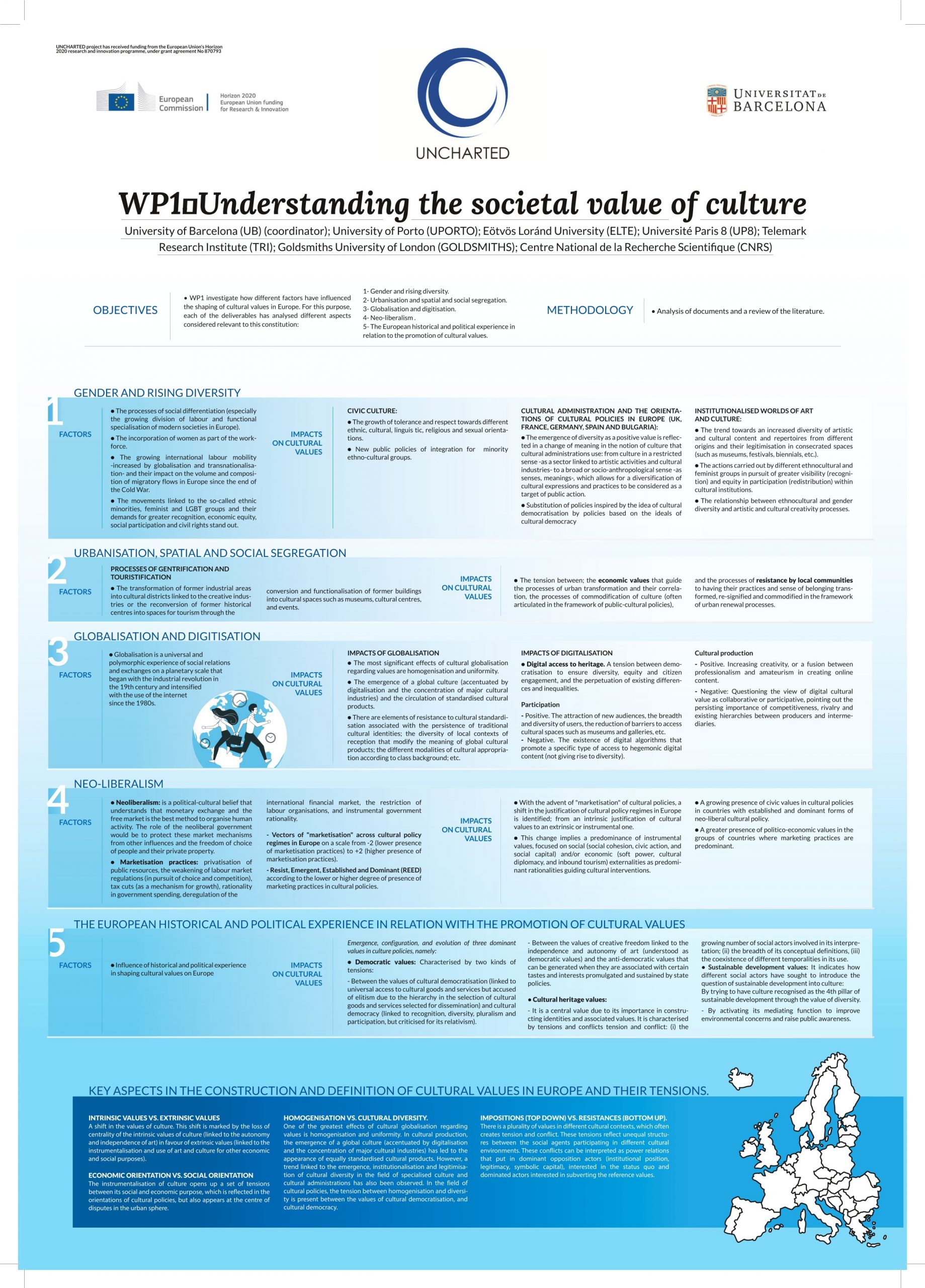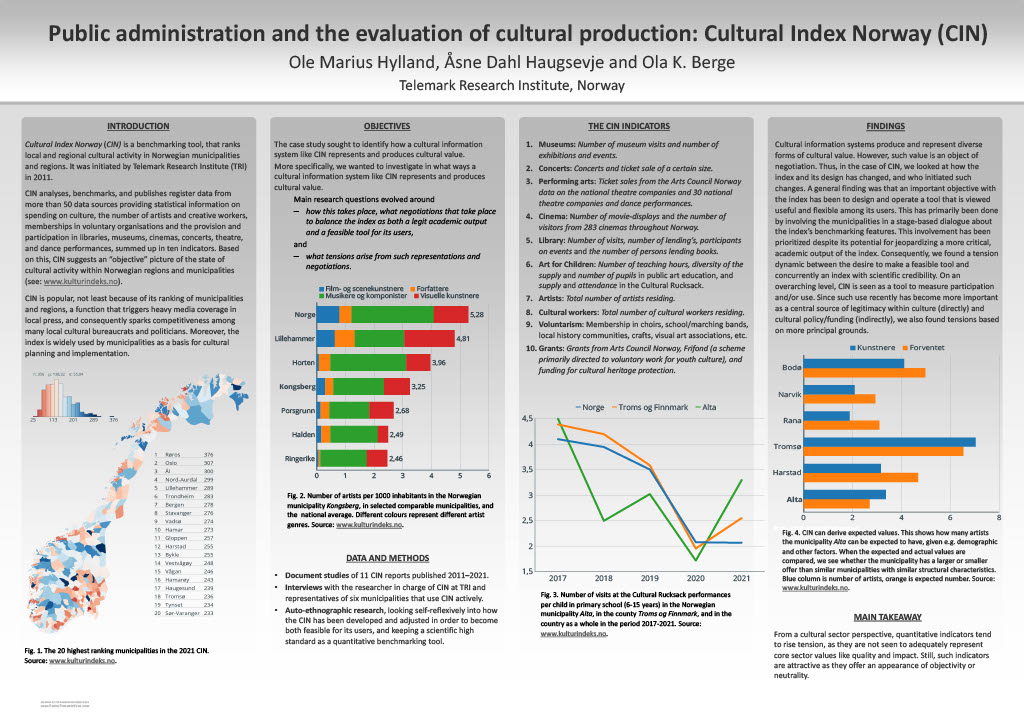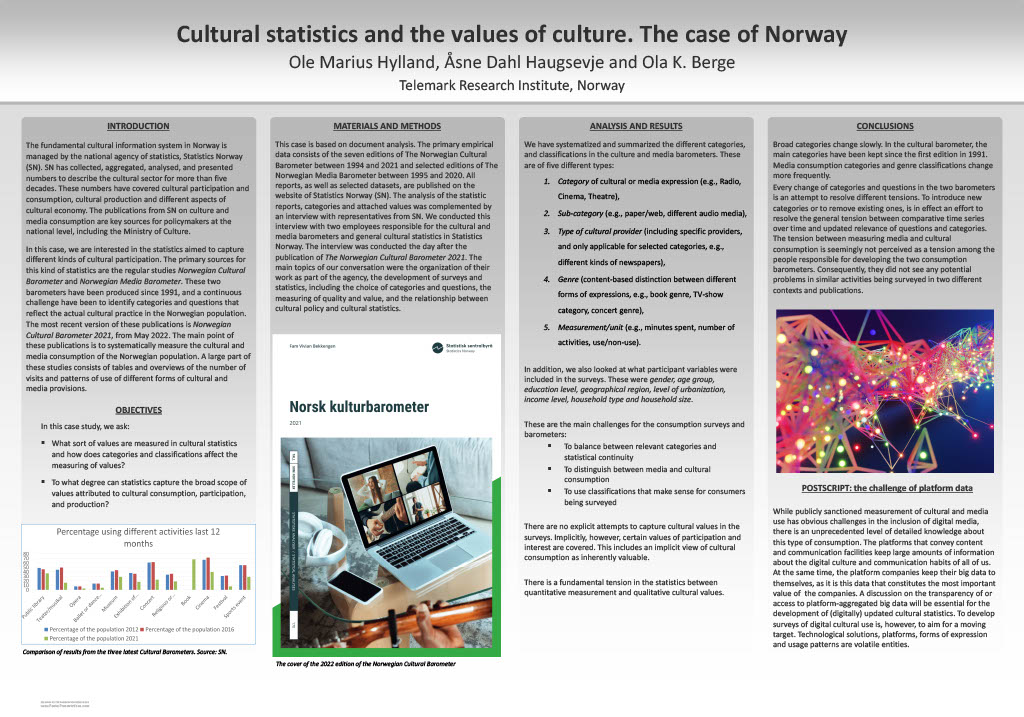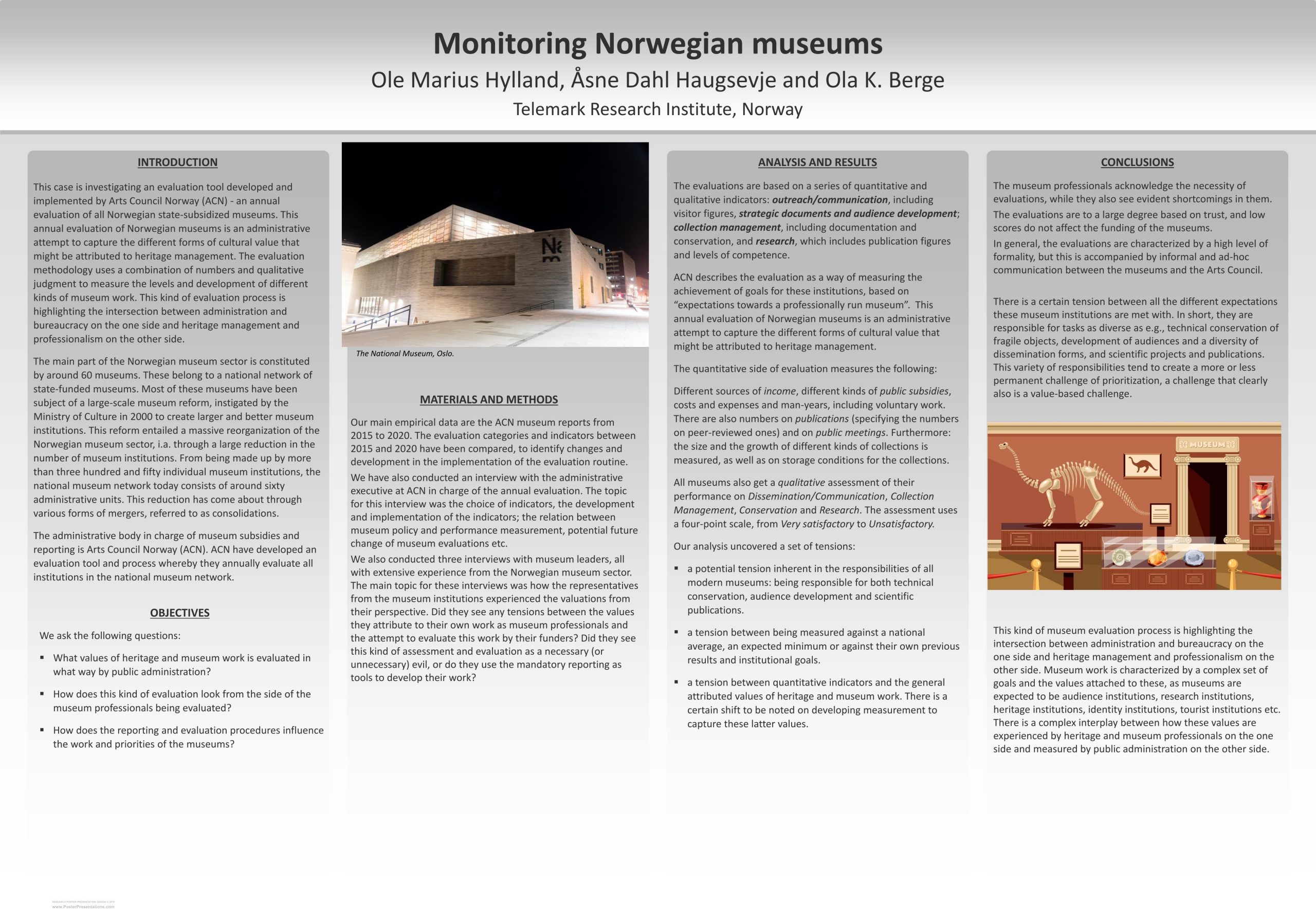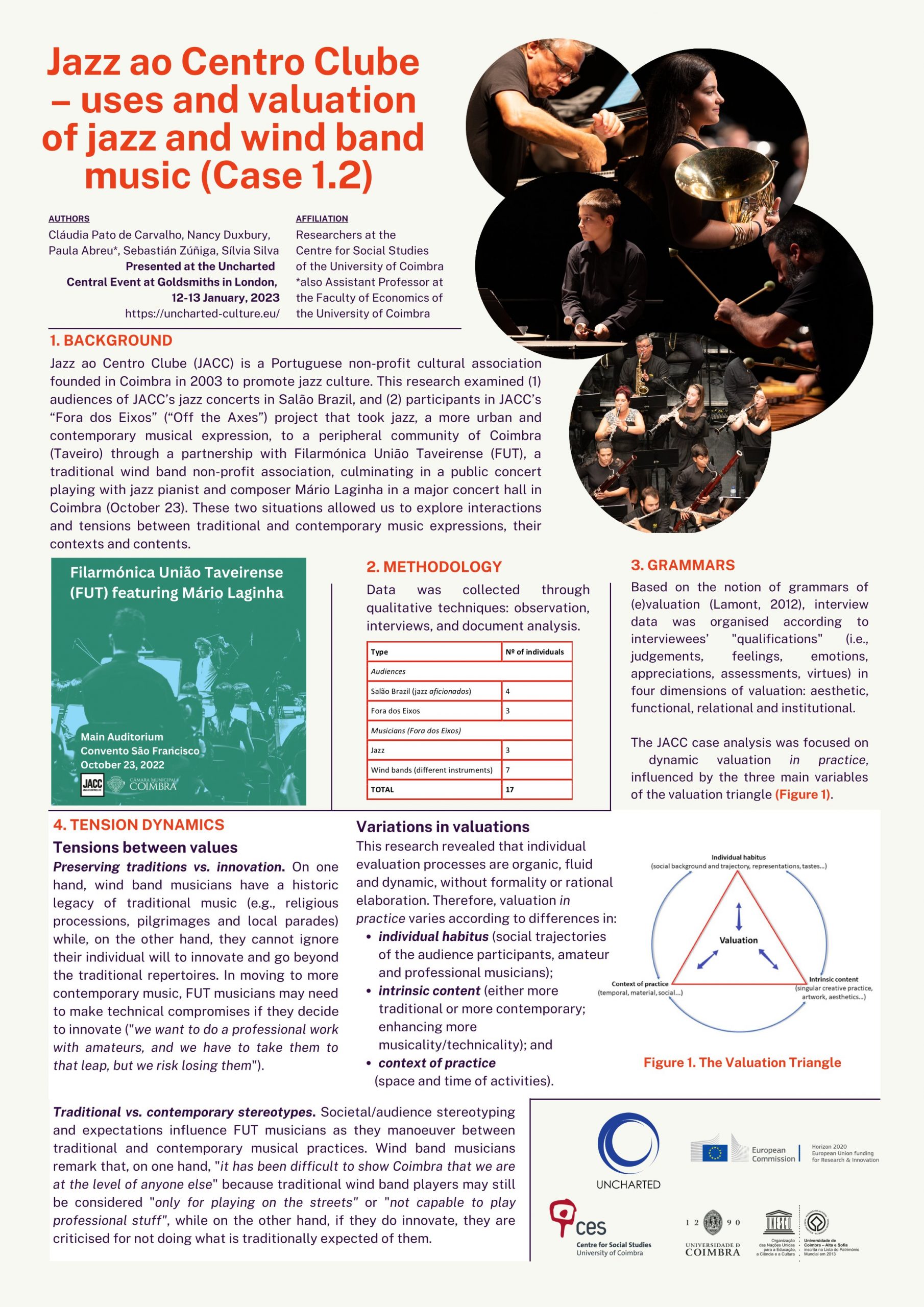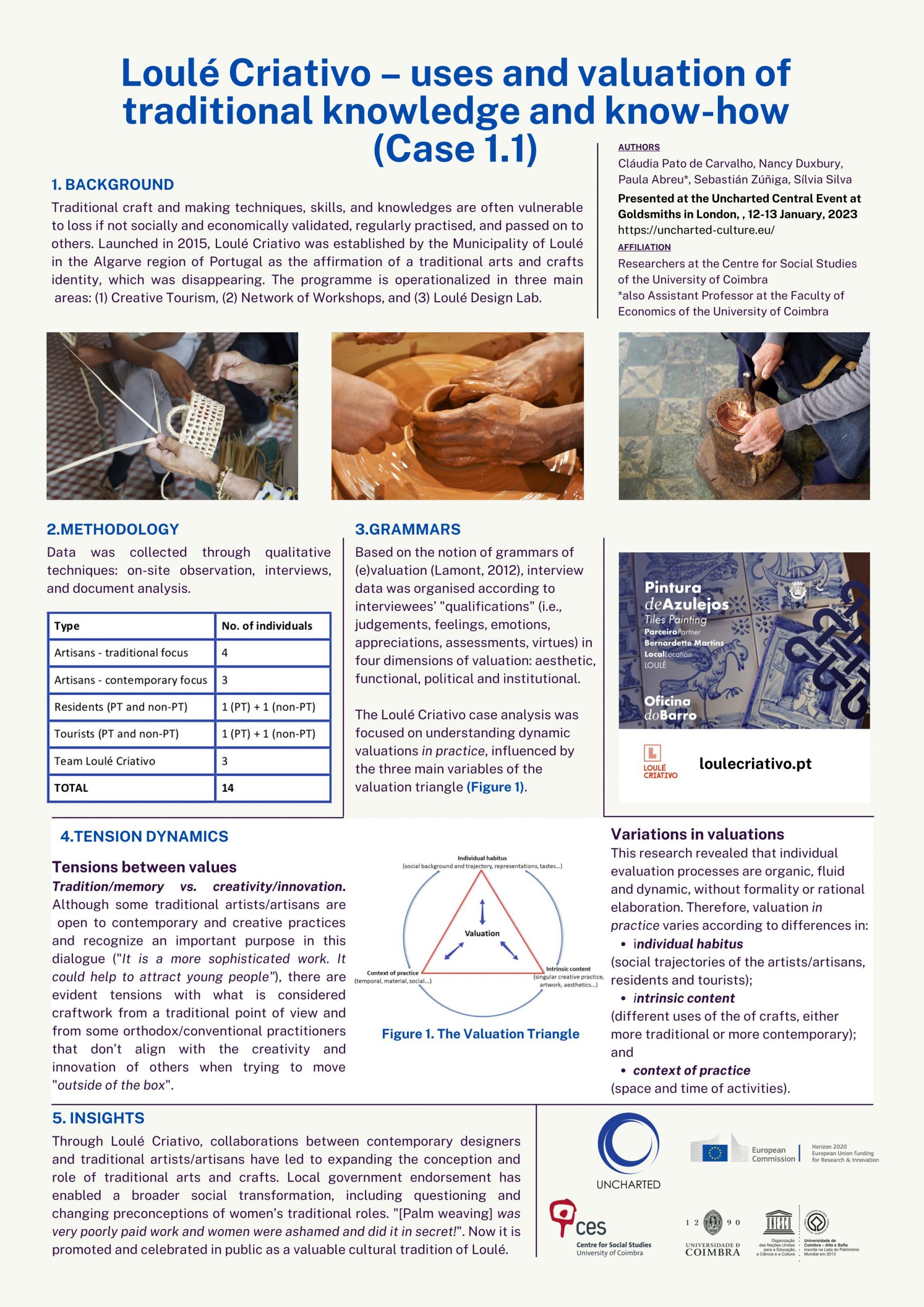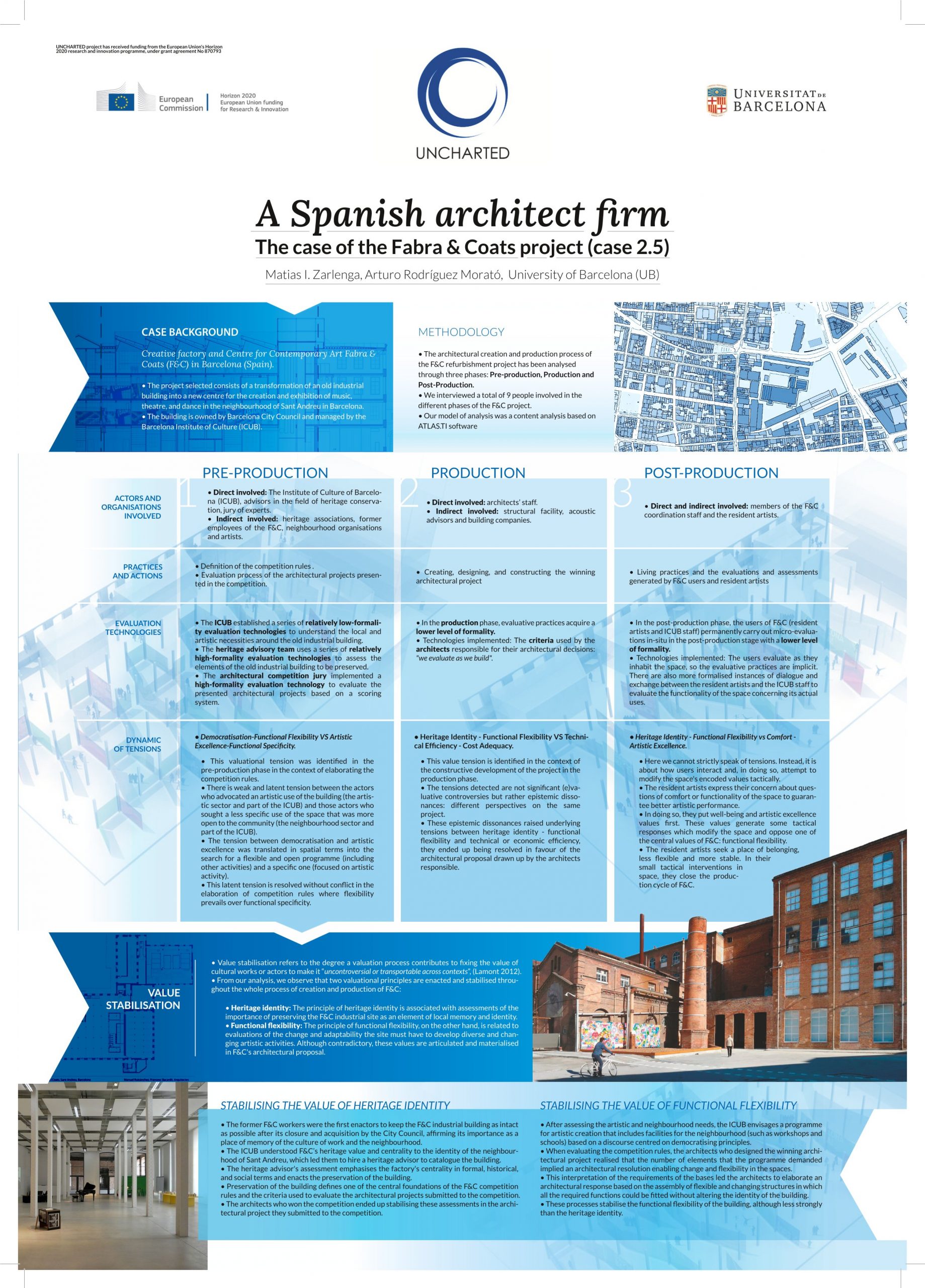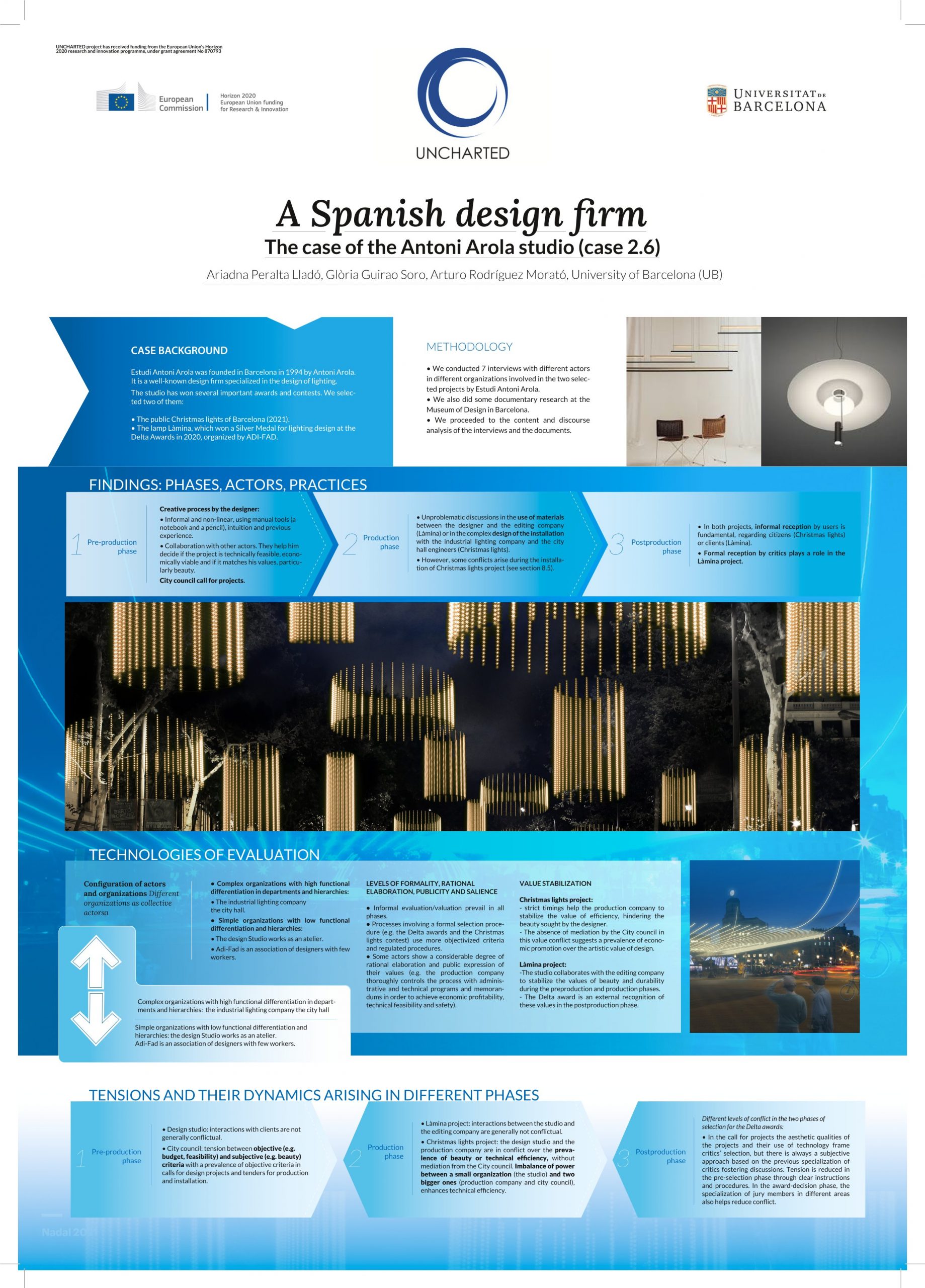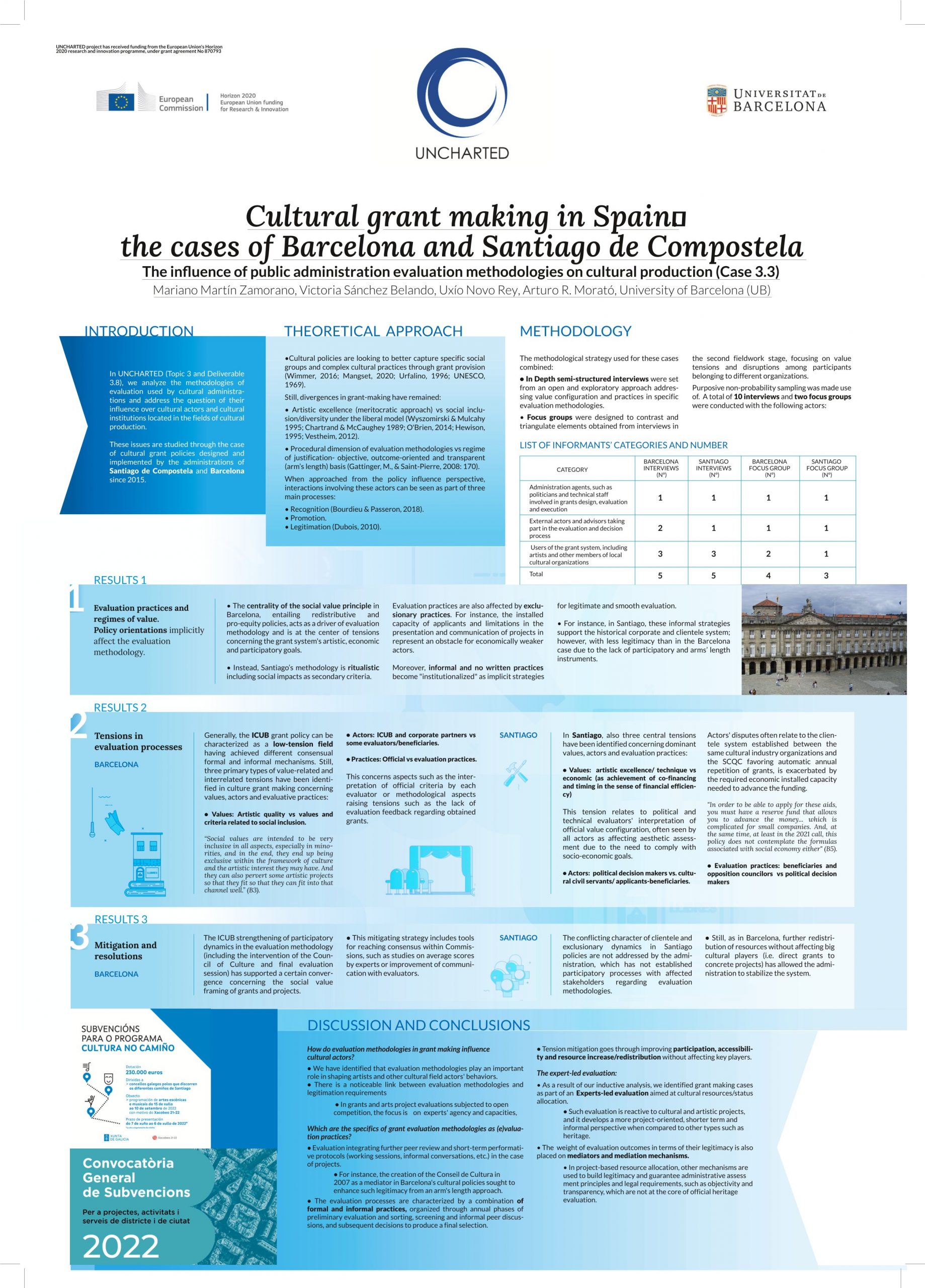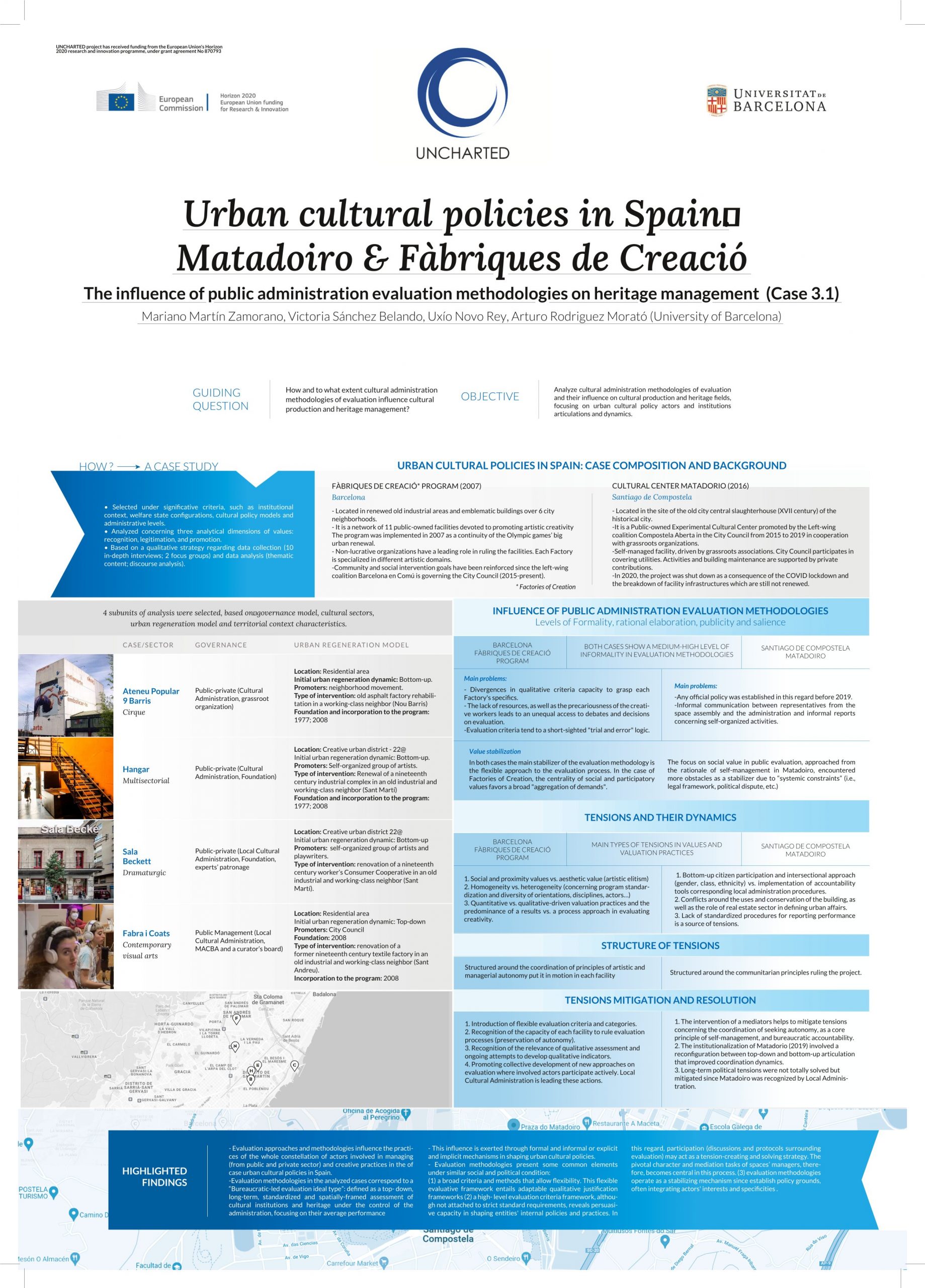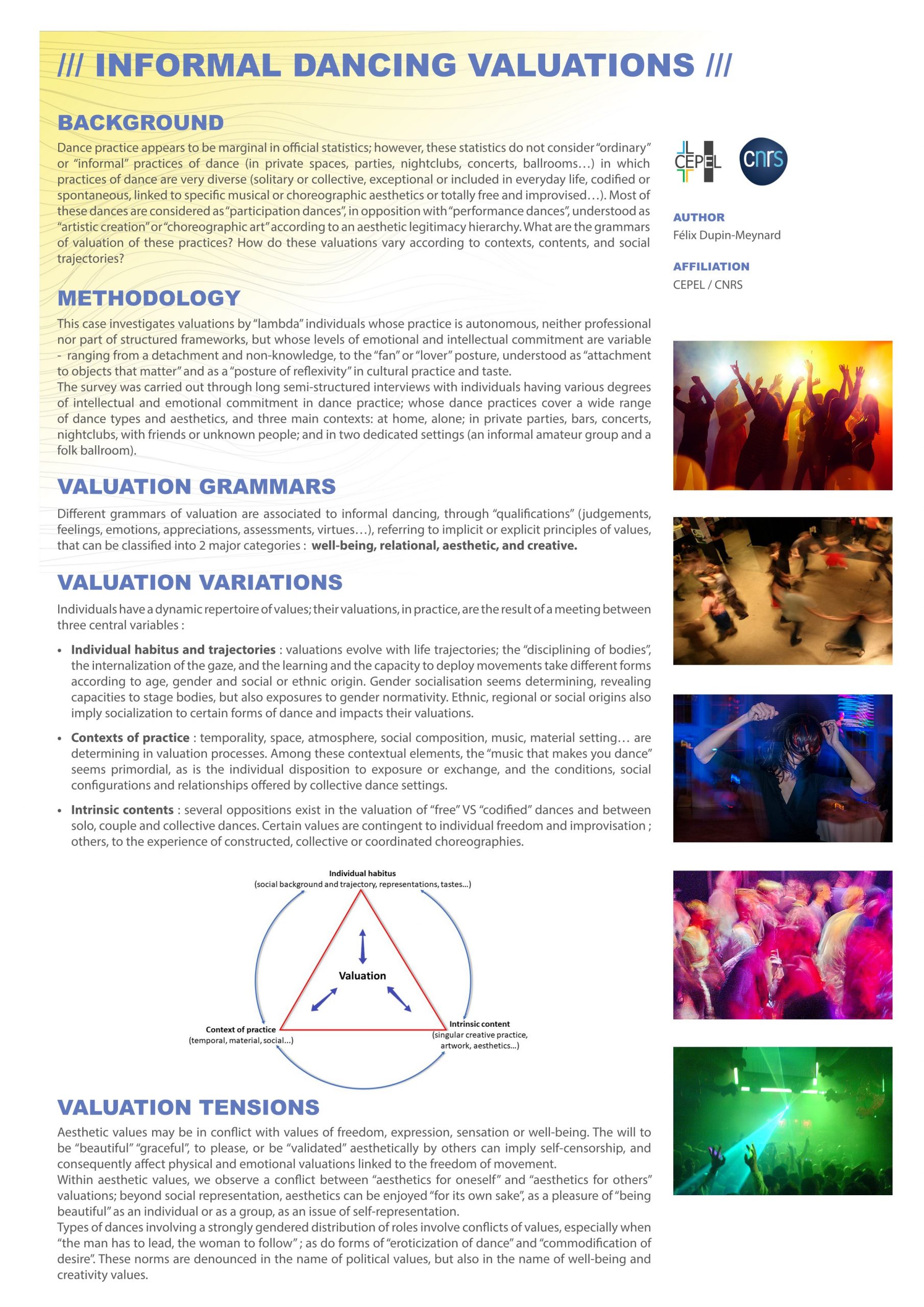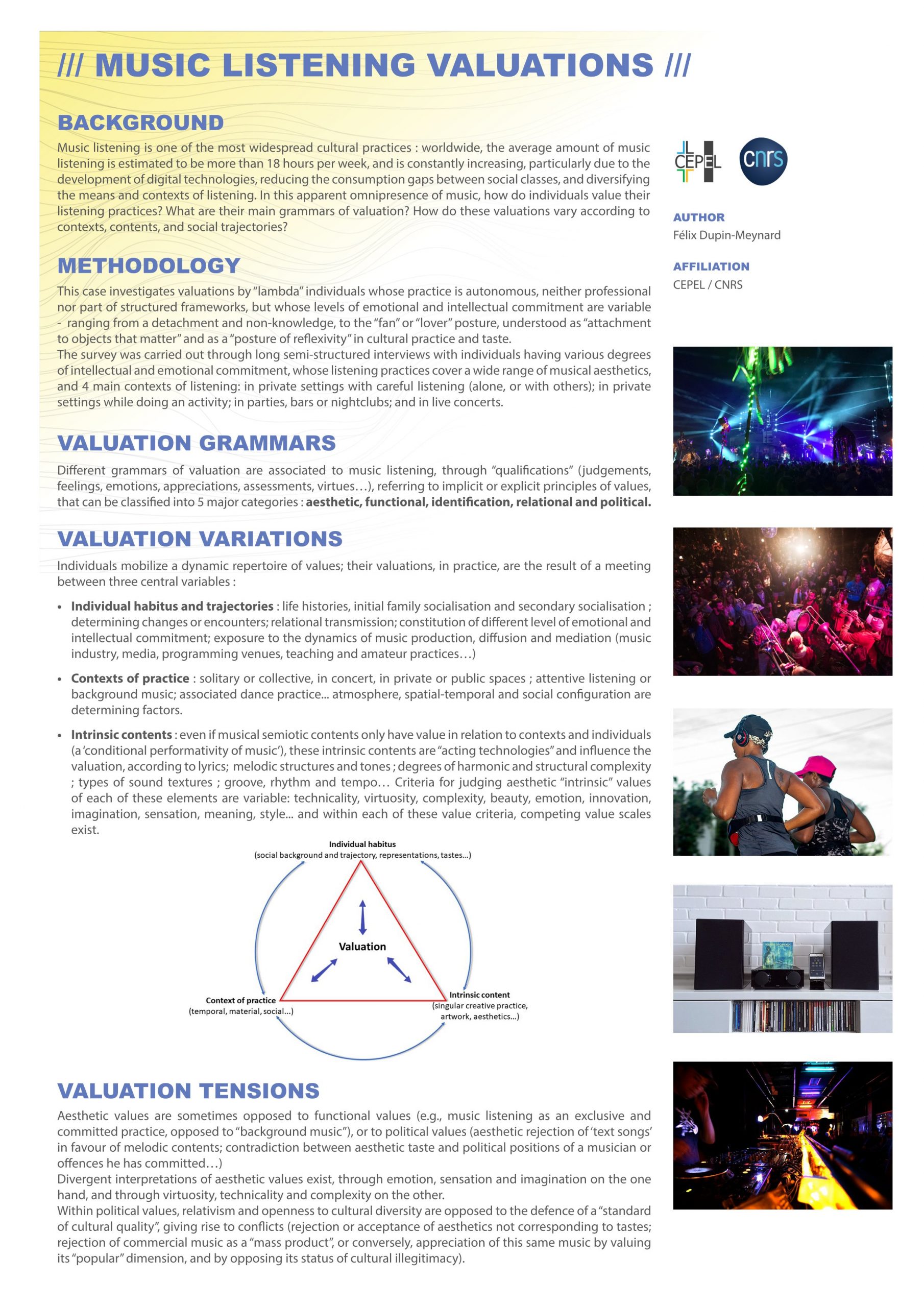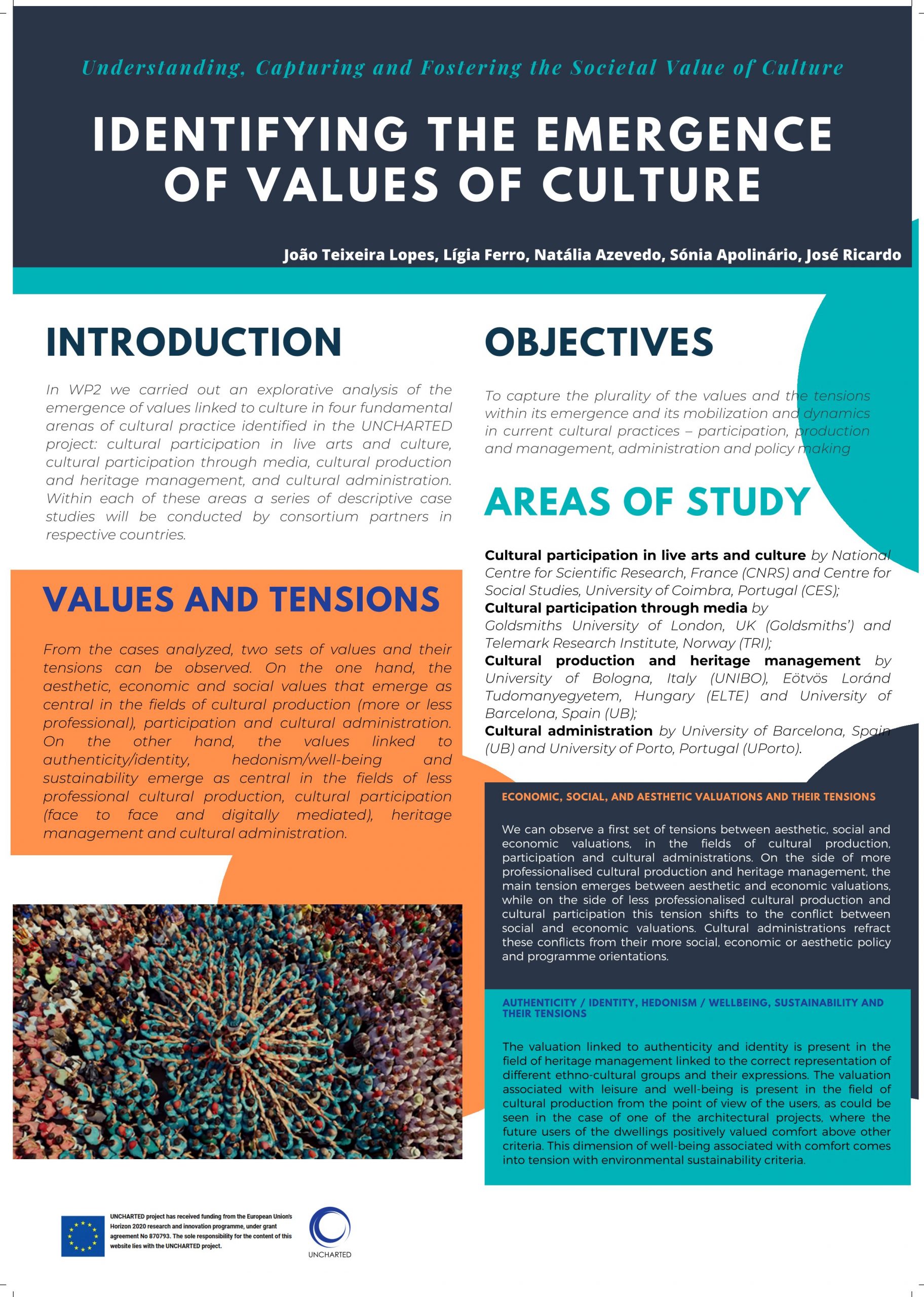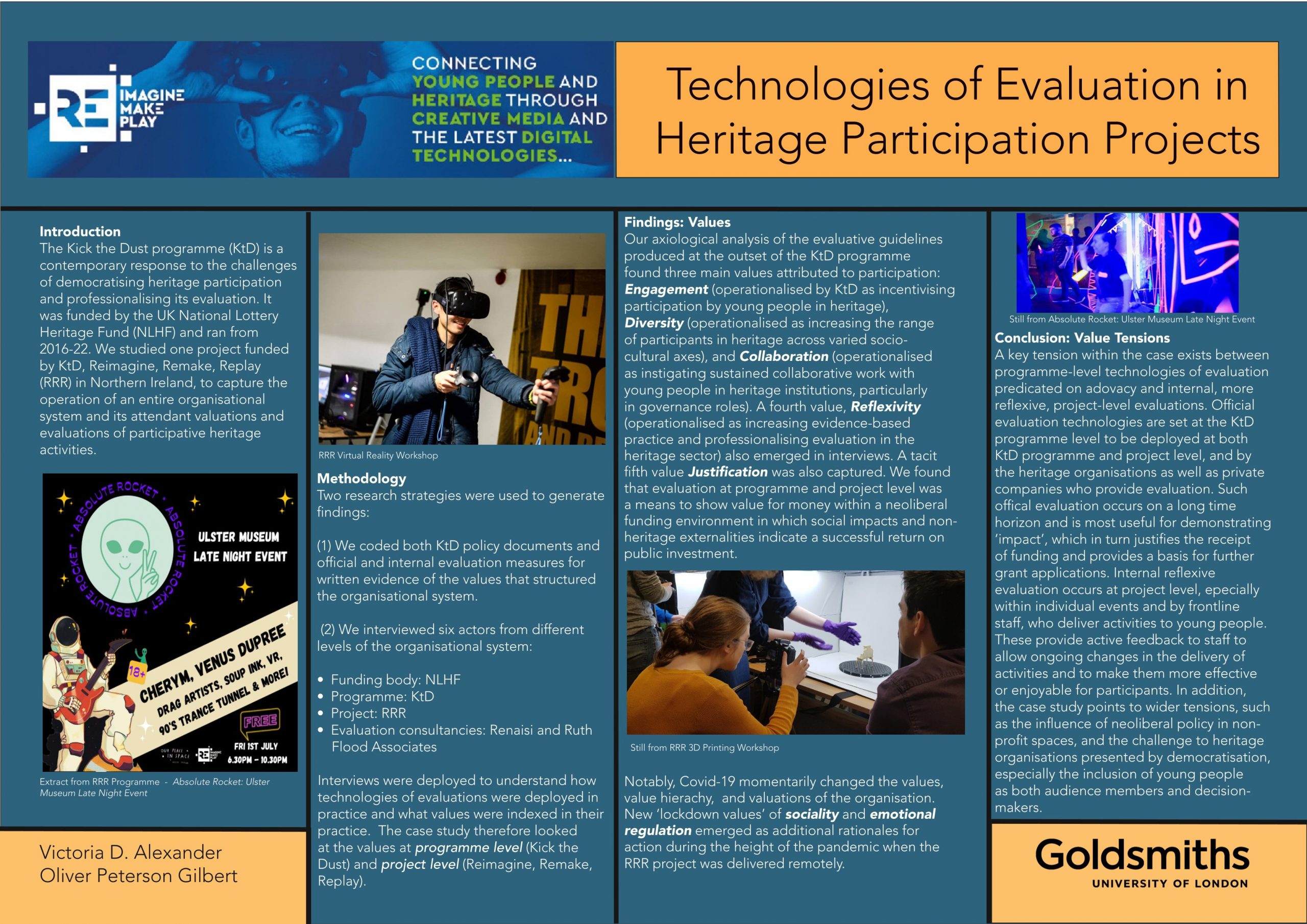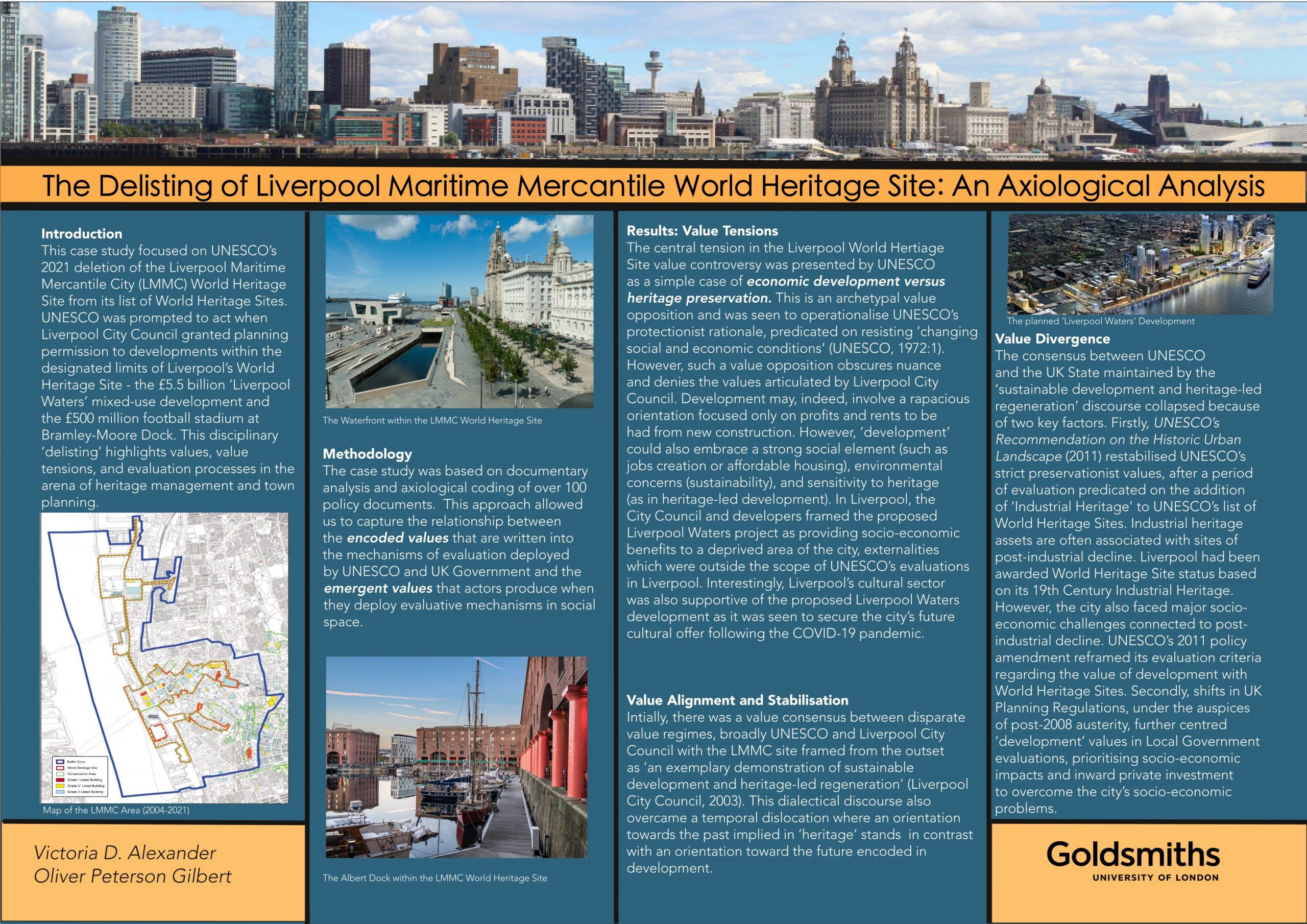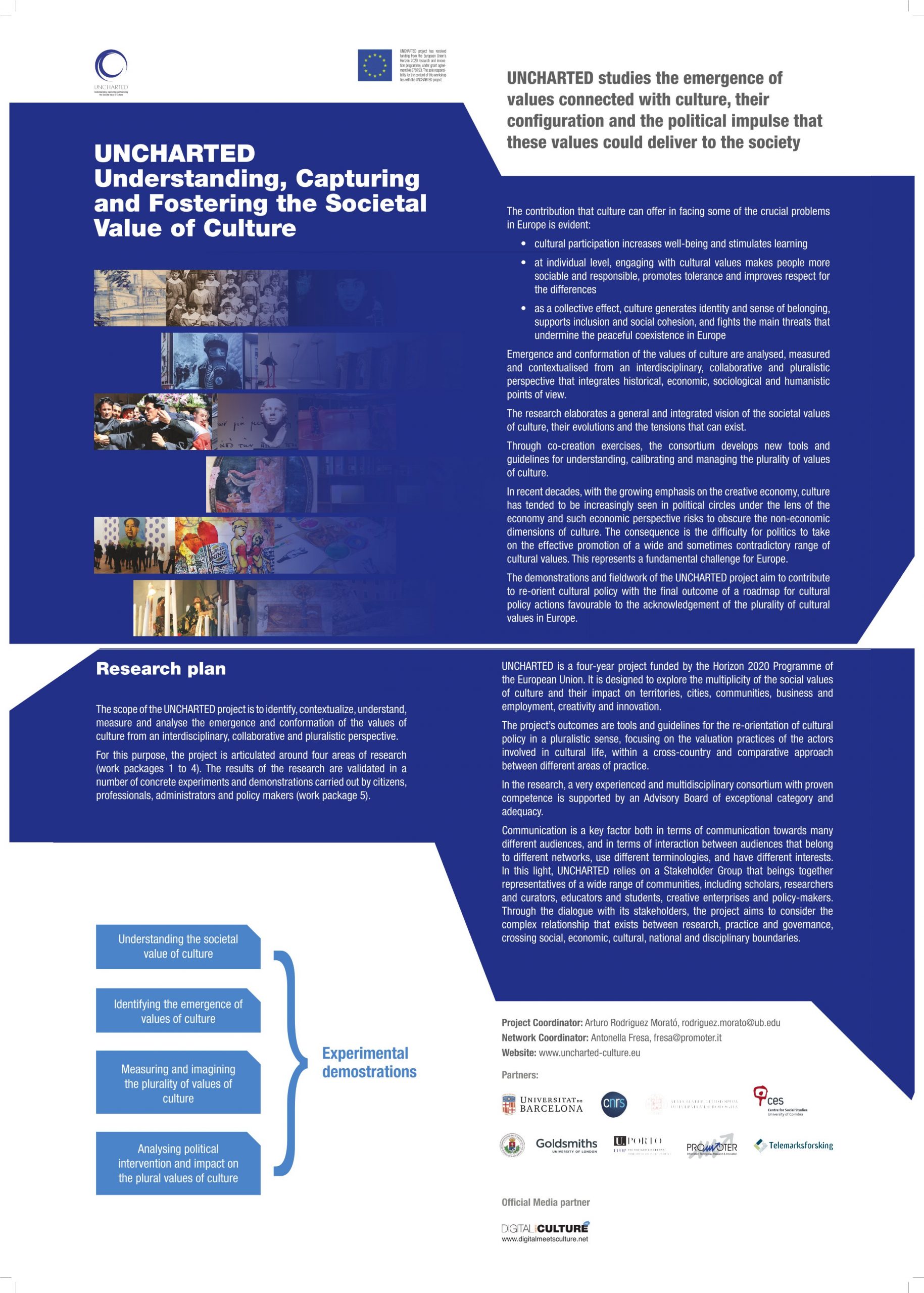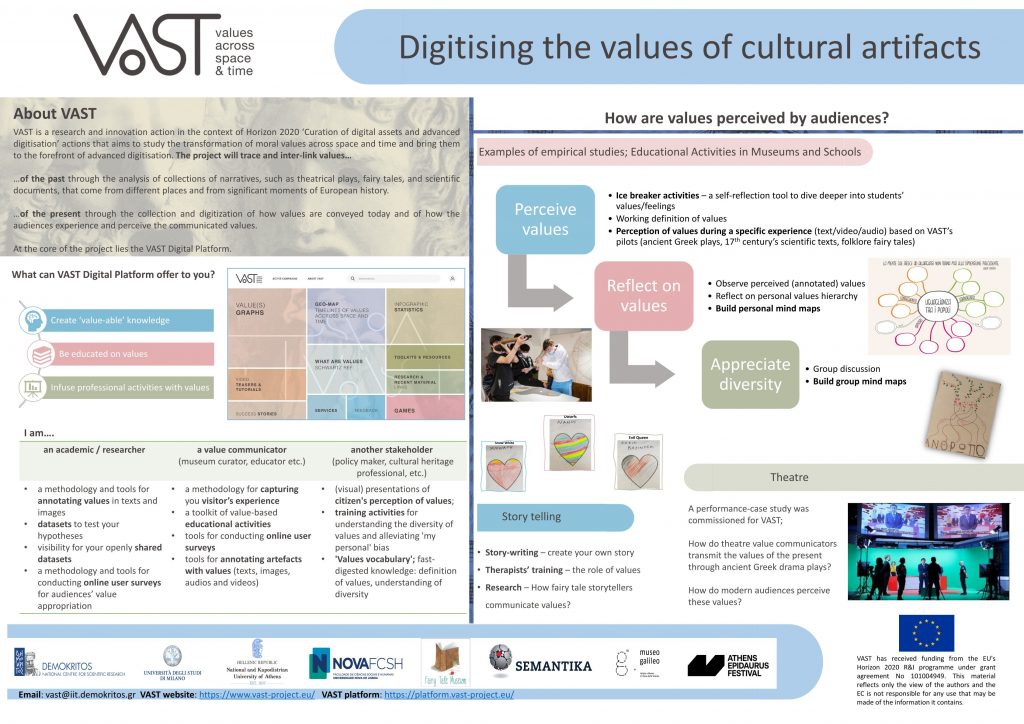
UNCHARTED Central Event in London
Goldsmiths, University of London
12 January 2023
Poster abstracts and downloads
Understanding the societal value of culture
A documents’ analysis and a literature review investigate how different factors have influenced the shaping of cultural values in Europe, taking into account different aspects considered relevant to this constitution:
1- Gender and rising diversity.
2- Urbanisation and spatial and social segregation.
3- Globalisation and digitisation.
4- Neo-liberalism .
5- The European historical and political experience in relation to the promotion of cultural values.
The poster illustrates the collaborative work carried out by the research partners of UNCHARTED: University of Barcelona (coordinator); University of Porto; Eötvös Loránd University-ELTE; Université Paris 8; Telemark Research Institute; Goldsmiths University of London; Centre National de la Recherche Scientifique-CNRS.
You can download here the PDF file of the poster.
Public administration and the evaluation of cultural production: Cultural Index Norway (CIN)
Cultural Index Norway (CIN) is a benchmarking tool, that ranks local and regional cultural activity in Norwegian municipalities and regions. The poster presents the case study run in UNCHARTED, which sought to identify how a cultural information system like CIN represents and produces cultural value. The study’s main outcome is that from a cultural sector perspective, quantitative indicators could rise tension as long as they are not representing core sector values. However, these indicators are attractive as they offer an appearance of objectivity or neutrality.
The poster is presented by Ole Marius Hylland, Åsne Dahl Haugsevje and Ola K. Berge from Telemark Research Institute, Norway.
You can download here the PDF file of the poster.
Cultural statistics and the values of culture: the case of Norway
The fundamental cultural information system in Norway is managed by the national agency of statistics, Statistics Norway (SN). SN has collected, aggregated, analysed, and presented numbers to describe the cultural sector for more than five decades. These numbers have covered cultural participation and consumption , cultural production and different aspects of cultural economy. The publications from SN on culture and media consumption are key sources for policymakers at the national level, including the Ministry of Culture. In this case, the Norwegian partner of UNCHARTED looked at the statistics aiming to capture different kinds of cultural participation, using document analysis. The study demonstrated that there is a fundamental tension in the statistics between quantitative measurement and qualitative cultural values.
The poster is presented by Ole Marius Hylland, Åsne Dahl Haugsevje and Ola K. Berge from Telemark Research Institute, Norway.
You can download here the PDF file of the poster.
Monitoring Norwegian museums
This poster presents the investigation about an evaluation tool developed and implemented by Arts Council Norway (ACN) – an annual evaluation of all Norwegian state-subsidized museums. This annual evaluation of Norwegian museums is an administrative attempt to capture the different forms of cultural value that
might be attributed to heritage management. The evaluation methodology uses a combination of numbers and qualitative judgment to measure the levels and development of different kinds of museum work. This kind of evaluation process is highlighting the intersection between administration and bureaucracy on the one side and heritage management and professionalism on the other side.
The poster is presented by Ole Marius Hylland, Åsne Dahl Haugsevje and Ola K. Berge from Telemark Research Institute, Norway.
You can download here the PDF file of the poster.
Jazz ao Centro Clube
Jazz ao Centro Clube (JACC) is a Portuguese non-profit cultural association founded in Coimbra in 2003 to promote jazz culture. This poster presents the case study conducted in the frame of UNCHARTED that examined (1) audiences of JACC’s jazz concerts in Salão Brazil, and (2) participants in JACC’s “Fora dos Eixos” (“Off the Axes”) project that took jazz, a more urban and contemporary musical expression, to a peripheral community of Coimbra (Taveiro) through a partnership with Filarmónica União Taveirense (FUT), a
traditional wind band non-profit association, culminating in a public concert playing with jazz pianist and composer Mário Laginha in a major concert hall in Coimbra (October 23). These two situations allowed to explore interactions and tensions between traditional and contemporary music expressions, their contexts and contents.
The poster is presented by Cláudia Pato de Carvalho, Nancy Duxbury, Paula Abreu*, Sebastián Zúñiga, Sílvia Silva from the Centre for Social Studies of the University of Coimbra, Portugal.
* Paula is also Assistant Professor at the Faculty of Economics of the University of Coimbra.
You can download here the PDF file of the poster.
Loulé Criativo
Traditional craft and making techniques, skills, and knowledges are often vulnerable to loss if not socially and economically validated, regularly practised, and passed on to others. Launched in 2015, Loulé Criativo was established by the Municipality of Loulé in the Algarve region of Portugal as the affirmation of a traditional arts and crafts identity, which was disappearing. The programme is operationalized in three main areas: (1) Creative Tourism, (2) Network of Workshops, and (3) Loulé Design Lab.
The poster is presented by Cláudia Pato de Carvalho, Nancy Duxbury, Paula Abreu*, Sebastián Zúñiga, Sílvia Silva from the Centre for Social Studies of the University of Coimbra, Portugal.
* Paula is also Assistant Professor at the Faculty of Economics of the University of Coimbra.
You can download here the PDF file of the poster.
A Spanish architect firm: the case of the Fabra & Coats project
The project selected for the case study consists of a transformation of an old industrial building into a new centre for the creation and exhibition of music, theatre, and dance in the neighbourhood of Sant Andreu in Barcelona. The building is owned by Barcelona City Council and managed by the Barcelona Institute of Culture (ICUB). The architectural creation and production process of the F&C refurbishment project has been analysed through three phases: Pre-production, Production and Post-Production.
The poster is presented by Matias I. Zarlenga, Arturo Rodríguez Morató from the University of Barcelona, Spain.
You can download here the PDF file. of the poster
A Spanish design firm: the case of the Antoni Arola studio
Estudi Antoni Arola was founded in Barcelona in 1994 by Antoni Arola.
It is a well-known design firm specialized in the design of lighting. The studio has won several important awards and contests. Two awares were selected to be analysed in the case study: The public Christmas lights of Barcelona (2021) and The lamp Làmina, which won a Silver Medal for lighting design at the Delta Awards in 2020, organized by ADI-FAD. Tensions emerged during Pre-production, Production and Post-production phases were studied.
The poster is presented by Ariadna Peralta Lladó, Glòria Guirao Soro, Arturo Rodríguez Morató from the University of Barcelona, Spain.
You can download here the PDF file of the poster.
Cultural grant making in Spain: the cases of Barcelona and Santiago de Compostela
The methodologies of evaluation used by cultural administrations were analysed, address the question of their influence over cultural actors and cultural institutions located in the fields of cultural production. These issues are studied through the case of cultural grant policies designed and implemented by the administrations of Santiago de Compostela and Barcelona since 2015.
The poster is presented by Martín Zamorano, Victoria Sánchez Belando, Uxío Novo Rey, Arturo R. Morató from the University of Barcelona, Spain.
You can download here the PDF file of the poster.
Urban cultural policies in Spain: Matadoiro & Fàbriques de Creació
The case studies have been selected under the criteria of institutional context, welfare state configurations, cultural policy models and administrative levels. The studies analyzed three analytical dimensions of values: recognition, legitimation, and promotion. The poster illustrates the research process that has been based on a qualitative strategy regarding data collection – that carried out 10 in-depth interviews and 2 focus groups – and data analysis – including tematic content and discourse analysis.
The poster is presented by Mariano Martín Zamorano, Victoria Sánchez Belando, Uxío Novo Rey, Arturo Rodriguez Morató from the University of Barcelona, Spain.
You can download here the PDF file of the poster.
Informal dancing valuation
Dance practice appears to be marginal in official statistics; however, these statistics do not consider “ordinary” or “informal” practices of dance (in private spaces, parties, nightclubs, concerts, ballrooms…) in which practices of dance are very diverse (solitary or collective, exceptional or included in everyday life, codified or spontaneous, linked to specific musical or choreographic aesthetics or totally free and improvised…). Most of these dances are considered as “participation dances”, in opposition with “performance dances”, understood as “artistic creation” or “choreographic art” according to an aesthetic legitimacy hierarchy. What are the grammars of valuation of these practices? How do these valuations vary according to contexts, contents, and social trajectories?
The poster is presented by Félix Dupin-Meynard from the CEPEL / CNRS, France.
You can download here the PDF file of the poster.
Music listening valuation
Music listening is one of the most widespread cultural practices : worldwide, the average amount of music
listening is estimated to be more than 18 hours per week, and is constantly increasing, particularly due to the
development of digital technologies, reducing the consumption gaps between social classes, and diversifying
the means and contexts of listening. In this apparent omnipresence of music, how do individuals value their
listening practices? What are their main grammars of valuation? How do these valuations vary according to
contexts, contents, and social trajectories?
The poster is presented by Félix Dupin-Meynard from the CEPEL / CNRS, France.
You can download here the PDF file of the poster.
LUQ: the process of accreditation of regional museums
In 2018, the Italian Ministry of Culture established the National and Regional Museums Systems to create a new Tripadvisor of Culture. To be part of the systems, national and regional museums must comply with uniform quality standards (LUQ). The Ministry designed the LUQ’s evaluation process through an online self-administered questionnaire to be filled out by museums. It tasked the regional cultural offices to handle the questionnaire distribution and evaluation. At the end of 2021, in Emilia-Romagna, the regional heritage agency Servizio Patrimonio Culturale (SPC) sent the questionnaire to the 500 regional museums, and 157 museums completed it. The poster presents the observation of the 9-week-long winding process of evaluation performed by SPC, which eventually granted the “museum of quality” stamp to 100 museums.
The poster is presented by the University of Bologna, Italy.
You can download here the PDF file of the poster.
Identifying the emergence of values of culture
An explorative analysis of the emergence of values linked to culture was conducted in four fundamental
arenas of cultural practice identified in the UNCHARTED project: cultural participation in live arts and culture,
cultural participation through media, cultural production and heritage management, and cultural administration. Within each of these areas a series of descriptive case studies was conducted by consortium partners in their respective countries. The poster illustrates this process where two sets of values and their
tensions have been observed. On the one hand, the aesthetic, economic and social values that emerge as
central in the fields of cultural production (more or less professional), participation and cultural administration. On the other hand, the values linked to authenticity/identity, hedonism/well-being and
sustainability emerge as central in the fields of less professional cultural production, cultural participation
(face to face and digitally mediated), heritage management and cultural administration.
The poster is presented by João Teixeira Lopes, Lígia Ferro, Natália Azevedo, Sónia Apolinário, José Ricardo of the University of Porto, Portugal.
You can download here the PDF file of the poster.
Technologies of evaluation in heritage participation projects
The Kick the Dust programme (KtD) is a contemporary response to the challenges of democratising heritage participation and professionalising its evaluation. It was funded by the UK National Lottery Heritage Fund and ran from 2016-22. The poster presents the study of the project Reimagine, Remake, Replay, run in un Northern Ireland, funded by KtD. The case study focused on capturing the operation of an entire organisational system and its attendant valuations and evaluations of participative heritage activities.
The poster is presented by Victoria D. Alexander Oliver Peterson Gilbert of Goldsmits University of London.
You can download here the PDF file of the poster.
The delisting of Liverpool Maritime Mercantile World Heritage Site: an axiological analysis
This poster illustrates the case study focused on UNESCO’s 2021 deletion of the Liverpool Maritime Mercantile City (LMMC) World Heritage Site from its list of World Heritage Sites. UNESCO was prompted to act when Liverpool City Council granted planning permission to developments within the
designated limits of Liverpool’s World Heritage Site – the £5.5 billion ‘Liverpool Waters’ mixed-use development and the £500 million football stadium at Bramley-Moore Dock. The research studied this disciplinary ‘delisting’ that highlights values, value tensions and evaluation processes in the arena of heritage management and town planning.
The poster is presented by Victoria D. Alexander Oliver Peterson Gilbert of Goldsmits University of London.
You can download here the PDF file of the poster.
Experimental demonstrations: the applied dimension of the UNCHARTED project
Experiments and demonstrations cover the three axes where the development of cultural values is studied, namely: Cultural strategic planning, Culture-led urban regeneration and Cultural information systems. In
different contexts and with different methods and toolkits, a range of experimental and demonstrative processes of co-creation are conducted to assess how the research outcomes from previous and parallel work are reflected in real-life experiences and which is the actual impact that the theoretical investigation can deliver to policy makers, as the basis for the future exploitation of the project’s results. The poster illustrates the scope and the plans of the demonstrations conducted on the three axis.
The poster is presented by Antonella Fresa of Promoter S.r.l., Italy.
You can download here the PDF file of the poster.
VAST: Values accross space and time
VAST is a research and innovation action in the context of Horizon 2020, which collaborates with the UNCHARTED project and which participated in the UNCHARTED Central Event in London and its Poster Session.
Curation of digital assets and advanced digitisation are in the focus of VAST that aims to study the transformation of moral values across space and time and bring them to the forefront of advanced digitisation. The project traces and inter-link value of the past and of the present. At the core of the project lies the VAST Digital Platform.
The poster is presented by the VAST project.
You can download here the PDF file of the poster.

